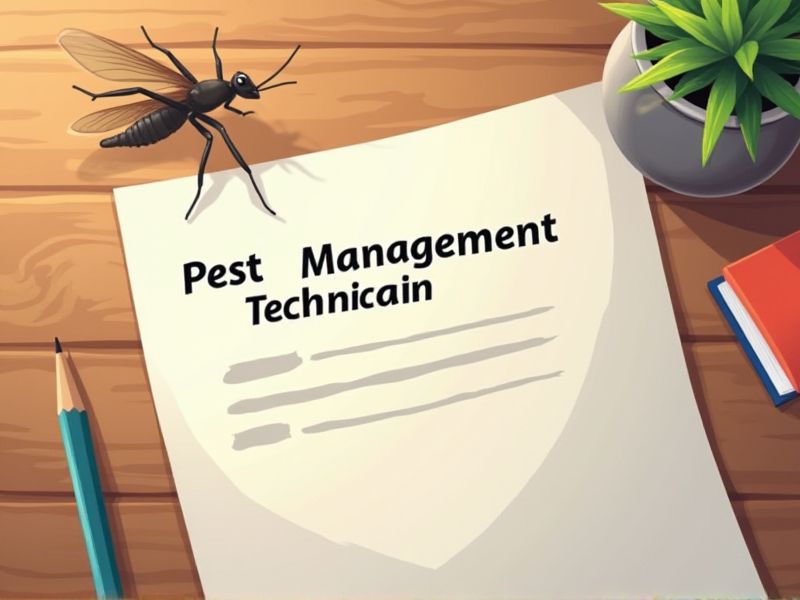
Pest management technicians require certifications to ensure they have the knowledge and skills to safely handle and apply pest control substances. Certification helps in complying with regulatory standards aimed at protecting public health and the environment from potential chemical hazards. It also enhances credibility, thereby increasing customer trust and business reputation. Key certifications may be essential for a Pest Management Technician.
EPA Pesticide Applicator Certification (General)
The EPA Pesticide Applicator Certification (General) is required to ensure that Pest Management Technicians are knowledgeable about safe pesticide use and its environmental impact. Understanding proper application techniques reduces the risk of harm to humans, non-target species, and ecosystems. Compliance with this certification helps prevent legal liabilities and fines associated with misuse or accidents. Adequate training enhances public trust by demonstrating a commitment to safety and sustainability in pest management practices.
EPA Restricted Use Pesticide Certification
The EPA Restricted Use Pesticide Certification is necessary to ensure that pest management technicians can safely handle and apply hazardous chemicals. This certification minimizes the risk of harm to human health and the environment by confirming that technicians are knowledgeable about proper usage and legal limitations. Without this certification, the potential for misuse and environmental contamination increases due to a lack of understanding of the chemicals' properties and effects. Regulating pesticide use through certification helps maintain ecological balance and public safety.
Integrated Pest Management (IPM) Certification
Integrated Pest Management (IPM) Certification equips pest management technicians with the knowledge to apply environmentally sustainable practices effectively, which helps reduce harmful chemical usage. Obtaining the certification often leads to improved customer trust, as clients tend to prefer services backed by recognized professional standards. A certified technician typically demonstrates higher proficiency in identifying and managing pest-related issues, enhancing service quality and efficiency. The certification supports regulatory compliance, ensuring that pest management practices meet governmental and industry standards for safety and environmental protection.
Fumigation Operator License
A Fumigation Operator License ensures that a pest management technician has specialized knowledge in handling hazardous chemicals. This license mandates adherence to safety protocols, thereby reducing the risk to public health and the environment. Proper licensing is legally required to ensure technicians comply with governmental regulations. Clients gain trust and confidence in a certified technician, likely leading to higher service quality and business reputation.
Rodent Control Certification
Rodent Control Certification ensures that pest management technicians have specialized knowledge and skills for effective rodent management, reducing potential property damage and health risks. Certified technicians adhere to industry standards and regulations, which enhance public trust and service quality. Certification provides a structured framework for learning advanced techniques, leading to more effective rodent management strategies. Competitive advantage in the job market often correlates with certification, as employers and clients prioritize technicians with proven expertise.
Termite Management Certification
Termite Management Certification provides pest management technicians with specialized knowledge to effectively identify and control termite infestations, ensuring effective service. Incomplete understanding of termite behaviors and habitats can lead to ineffective pest control strategies, increasing damage risk to structures. Certification ensures adherence to industry standards and regulations, enhancing customer trust and satisfaction. Proper credentials demonstrate a commitment to professional development and responsibility, crucial for maintaining a competitive edge in the pest control industry.
Mosquito Abatement Certification
Mosquito abatement certification equips pest management technicians with specialized knowledge on effectively controlling mosquito populations. This certification ensures that technicians adhere to safety protocols, minimizing harm to humans and the environment. With the certification, technicians can implement integrated pest management strategies tailored to specific mosquito species and habitats. Proper certification enhances public trust in pest control services, vital for addressing community-wide mosquito issues.
Pesticide Safety and Environmental Protection Certification
Pesticide Safety and Environmental Protection Certification ensures that pest management technicians apply pesticides responsibly, minimizing harm to humans and non-target species. Unregulated application can lead to environmental pollution, affecting soil, water, and biodiversity. Certified technicians are educated on the proper handling, storage, and disposal of pesticides, reducing the risk of accidental contamination. This certification aligns pest control practices with regulatory standards, promoting public health and environmental sustainability.
Hazardous Materials Handling Certification
The handling of pesticides involves chemical agents that can be harmful to both humans and the environment. Certification ensures that pest management technicians are knowledgeable about proper handling and application methods, reducing the risk of exposure. Without such certification, technicians might inadvertently cause environmental contamination or health issues. Obtaining the certification also aligns with regulatory compliance, protecting both workers and consumers from potential hazards.
Wildlife Damage Management Certification
Wildlife Damage Management Certification provides pest management technicians with the skills to address ecological concerns effectively. Proper certification ensures technicians are knowledgeable about humane and environmentally friendly control methods. Specialized training can lead to reduced liability for businesses by adhering to legal standards. Certified technicians are more trusted by clients, fostering better client relationships and business reputation.
Summary
By obtaining certifications, you enhance your credibility and trustworthiness in pest management services. This leads to an increase in client confidence and potentially boosts your clientele base. Certified technicians often have access to advanced industry resources and techniques, improving service quality. Your professional growth and marketability are likely to improve, resulting in better job opportunities and possibly higher income.
